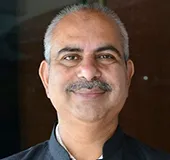
Elections 2019 has every flavour of the season but in this vibrant, noisy, no-holds barred democratic exercise there is a fall dude — the Election Commission of India (ECI). The ECI has a constitutional duty to act as a referee and all powers to exercise. However, the three-member commission appears listless, careless, an off-the-field third empire who occasionally wakes up from deep slumber or at the prodding of the Supreme Court to make its presence felt.
The ECI’s lethargy was in full display recently when it chose to punish Gujarat state BJP chief, banning him from campaigning for 48 hours when voting had already concluded in all 26 Lok Sabha seats of Gujarat. In the case of Uttar Pradesh Chief Minister Yogi Adityanath raising the “Bajrang Bali versus Hazrat Ali” bogey, the ECI helplessly watched Adityanath’s image being beamed across TV news channels chanting Hanuman Chalisa during the supposedly banned period. A somewhat triumphant Yogi boasted in front of CNN-News 18 Executive Editor Bhupendra Choubey later, “I was punished for taking Bajrang Bali’s name. Thus, I chanted it for the period I was banned."
The toxic campaign is not alone where the ECI or Election Commission of India is seen as a hopeless, helpless, and mute spectator. The central government has gone about conducting income tax raids on a number of opposition leaders and individuals who are considered to be either against the government or are critical of their governance. The opposition has also raised issues of national security — which the ECI had sought to discourage — without bothering about consequences.
The toxic campaign is not alone where the ECI or Election Commission of India is seen as a hopeless, helpless, and mute spectator.
The ECI’s inaction is in sharp contrast to its assertiveness in 2014 when it had recommended postponing certain policy decisions by the government related to natural gas pricing and notifying ecologically sensitive areas in the Western Ghats. Then the ECI had invoked the Model Code of Conduct (MCC).
What is the Model Code of Conduct? The MCC, mentioned in the Article 324 of the Constitution, is a set of guidelines issued by the ECI to regulate political parties and candidates prior to elections, in order to ensure a free and fair election. The constitutional provision gives the ECI the power to supervise elections and the MCC becomes operational from the date that the election schedule is announced till the date that results are announced.
The MCC was first introduced in the Kerala assembly elections in 1960 as a set of instructions to political parties regarding election meetings, speeches, slogans, etc. In the 1962 general elections, the MCC was circulated to recognize parties and State governments sought feedback from the various political parties operating in the state. The MCC was largely followed by all parties in the 1962 general elections and continued to be followed in subsequent all general elections that took place in the country.
In 1979, the ECI added a section to regulate the ‘party in power’ and prevent it from gaining an unfair advantage at the time of elections. There are eight key provisions of the MCC dealing with general conduct, meetings, processions, polling day, polling booths, observers, party in power, and election manifestos. It includes issues such as how one political party should criticise the other. The criticism should be confined to their policies and programs, past record and work.
Activities such as: (a) using caste and communal feelings to secure votes, (b) criticising candidates on the basis of unverified reports, (c) bribing or intimidation of voters, and (d) organising demonstrations or picketing outside houses of persons to protest against their opinions, are prohibited. Even a cursory look at four phases of electioneering would show that none of these provisions were followed. There was no semblance of any MCC or model code of conduct being implemented anywhere, be it the BJP-led NDA, the Congress-led UPA or regional leaders.
It must be remembered and emphasized that the Westminster model of parliamentary democracy has issues of propriety at premium. The MCC, therefore is based on assumption that political parties and candidates would accord importance to issue of propriety, ethics and morality. In the absence of these lofty principles, the Westminster model is reduced to ashes.
Britain, the cradle of parliamentary democracy has no written constitution. Political defections are rare and conventions have greater say than rules and laws. The Indian experience is the reverse of it. The MCC, without a stringent legal cover is impractical and toothless.
Indian political parties, courts, media and other sections of society need to ponder over issues of electoral malpractices and revisit the entire issue — the functioning of Election Commission of India, the applicability of the MCC, and electoral reforms. It is a cruel joke that poll expenses in a parliamentary polls (having over a million voters) has a ceiling of Rs70 lakh amounting to a candidate spending 70 paisa on every voter, which means that in effect the system makes every candidate and elected representative of the government corrupt and unlawful.
The ECI needs to be made broad-based, accountable and transparent. Members of civil society, prominent citizens, and retired members of judiciary should have lateral entry in state and central election bodies instead of a forum of pliable bureaucrats. The MCC needs to be overhauled and rewritten so that there is extensive discussion in public domain before it is implemented.
If the limit for poll expenses needs to be increased, it must be done. Public funding of polls is another area that requires debate. The question here is: Is there a political will that is not guided by political gains? That is the real test for Indian democracy.
The views expressed above belong to the author(s). ORF research and analyses now available on Telegram! Click here to access our curated content — blogs, longforms and interviews.




 PREV
PREV


